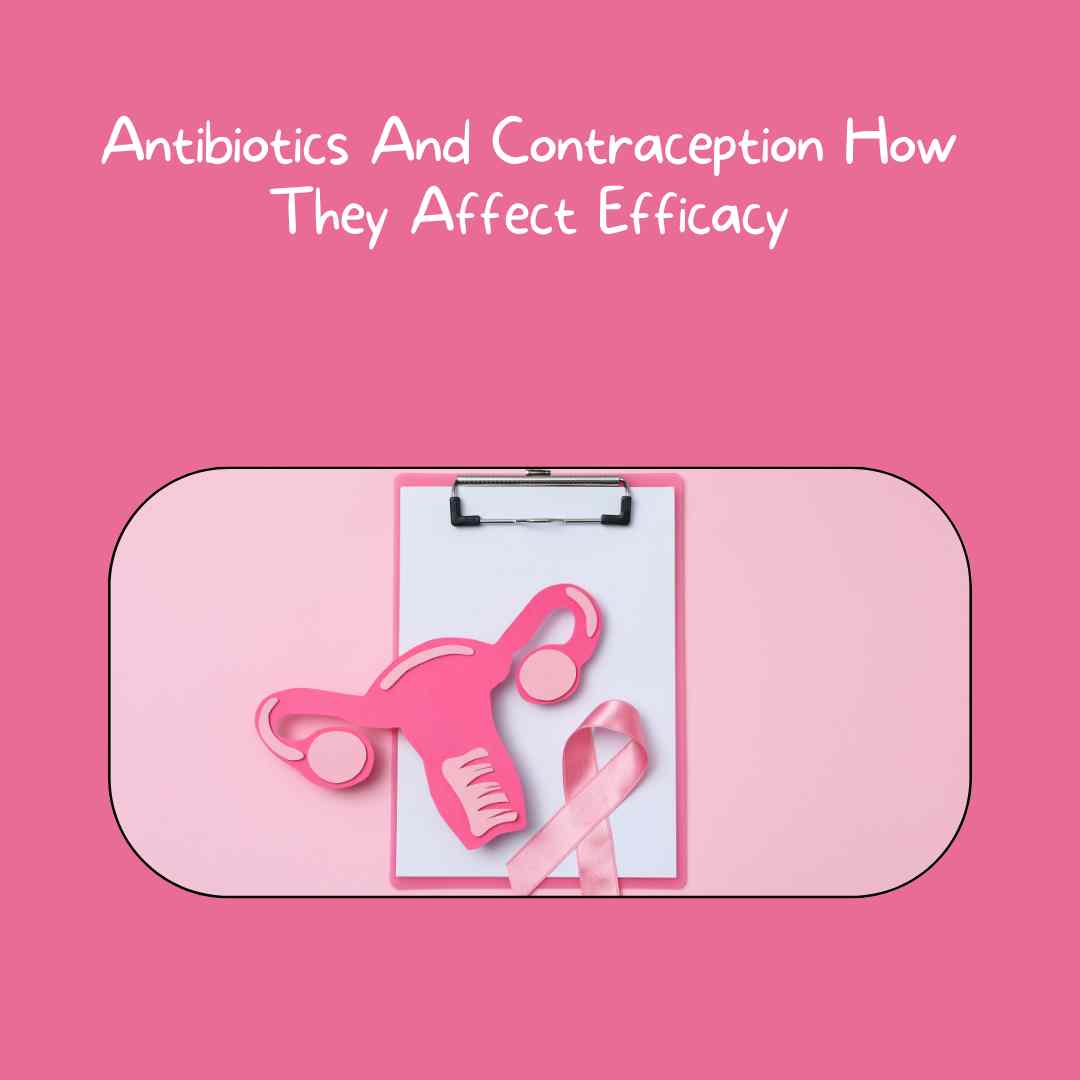Antibiotics And Contraception How They Affect Efficacy

As a healthcare professional, it is important to understand the ways in which antibiotics and contraception can interact with one another. This article will take a close look at how antibiotics can affect the efficacy of contraception and offer insight into the potential risks. It will also explore why it is essential to have a full understanding of these topics in order to provide the best care for patients. In addition, the article will explore the potential consequences of not being aware of these interactions. Finally, it will provide potential solutions to help mitigate any risks associated with the use of antibiotics and contraception.
Antibiotics and Contraception
Did you know that the effects of antibiotics on contraceptive efficacy can vary depending on the type of contraception? Antibiotics can interfere with hormonal birth control, like the pill, patch, and ring, by decreasing their effectiveness. This can lead to an increased risk of unintended pregnancy if these methods of contraception are used in combination with certain antibiotics. Studies have found that up to 33% of women taking antibiotics concurrently with the pill had a decrease in its effectiveness.

While contraceptive pills may not be as effective when taken with antibiotics, other long-acting reversible contraceptives (LARCs) such as intrauterine devices (IUDs) and implants are not affected by antibiotic use. Studies have shown that antibiotics do not reduce the success rate of these forms of birth control.
It is important to keep in mind that antibiotics can interact with certain forms of contraception, so it is best to consult with a healthcare provider before taking any medications. Additionally, it is advisable to use a non-hormonal backup contraception method, such as condoms, during the course of antibiotic treatment and for at least 7 days after the course is complete.
When it comes to contraception, it is important to stay informed and be aware of any potential interactions between medications and contraceptive methods. By doing so, women can ensure that they are able to use birth control safely and effectively. With the right information and resources, women can make sure that their contraception is up to date and that their contraceptive methods are providing them with the desired level of protection.
Types of Contraception
Contraception is an important tool for preventing unplanned pregnancies. Different types of contraception exist to provide individuals with options when deciding how to best protect themselves from unwanted pregnancies. The two primary types of contraception are barrier methods and hormonal methods.
Barrier methods of contraception such as condoms, diaphragms, and cervical caps prevent sperm from entering the uterus. They are easy to use but must be used correctly and consistently in order to be effective. Another type of contraception is hormonal methods. These include the pill, intrauterine devices, and contraceptive injections.

Hormonal contraceptives work by preventing ovulation, thickening the cervical mucus and thinning the lining of the uterus. All of these methods are effective when used correctly, however, studies have shown that antibiotic use can reduce the efficacy of both types of contraception.
Studies have found that antibiotics may reduce the effectiveness of oral contraceptives and other hormonal contraceptive methods. Additionally, antibiotics can decrease the efficacy of barrier methods of contraception by altering the pH of the vagina. Therefore, it is important to use additional protection when taking antibiotics and relying on contraception to prevent pregnancy. For more information, consult your healthcare provider or visit the Centers for Disease Control and Prevention website.
Effects of Antibiotics on Contraception
Antibiotics are commonly prescribed medications used to treat a variety of infections. Yet, what many people don’t know is that antibiotics can have an effect on the efficacy of certain types of contraception. Oral and other forms of hormonal contraception, such as contraceptive implants and injections, can be affected by antibiotic use, with varying levels of efficacy depending on the class of antibiotic being taken. According to the World Health Organisation, the effectiveness of hormonal contraception can be reduced by up to 50% when taken with certain antibiotics. Therefore, it is important to discuss contraception and drug interactions with your doctor prior to taking any antibiotics.
In addition to discussing contraception with your doctor, it is also important to consider other methods of contraception, such as condoms, when taking antibiotics. While condoms are not affected by antibiotic use, they have been proven to be 97% effective in preventing pregnancy when used properly. Additionally, condoms provide protection from sexually transmitted infections, which can be a greater risk when taking antibiotics.
Finally, it is important to note that antibiotic use can also have an effect on long-term and permanent methods of contraception, such as the IUD. Studies have shown that antibiotic use can reduce the efficacy of the IUD by up to 20%, which is important to consider when discussing choices with your doctor.
Overall, it is important to be aware of the potential effects of antibiotics on contraception, as well as the need to use other forms of contraception while taking antibiotics. By discussing contraception and antibiotic interactions with your doctor, you can ensure that you are taking the necessary
Interactions between Antibiotics and Contraception
Antibiotics are powerful medications used to treat bacterial infections, and contraception is used to prevent pregnancy. While both medications are effective at achieving their intended purposes, there is also a potential for them to interact with one another and reduce the overall efficacy of both.
Research shows that certain antibiotics may reduce the effectiveness of certain contraceptives, such as the oral contraceptive pill. A study by the British Journal of Clinical Pharmacology found that women taking broad-spectrum antibiotics were at an increased risk of unintended pregnancy.
The primary concern is that antibiotics reduce the absorption of hormones in birth control pills. As a result, the body may not get the full dose of hormones necessary for the contraceptive to be effective. Women should be aware that some antibiotics can reduce the effectiveness of combined oral contraceptives in a dose-dependent manner.
The best way to minimize the risk of any interaction is to discuss your medication choices with your doctor. This is important, as some antibiotics may interact with birth control pills and other forms of contraception. Your doctor may be able to recommend alternative antibiotics that are known to have no effect on contraception or a different form of contraception such as condoms or an IUD that is unlikely to be affected by antibiotics.
Ultimately, any woman taking antibiotics should be aware of the potential risks of interactions with contraceptive medications, and consult their doctor for further advice. Further information can also be found on the Centers for Disease Control and Prevention website.
Missed Doses and Contraception
Antibiotics and contraception can be hugely effective when taken correctly, but taking too few of either can lead to reduced efficacy. According to the Centers for Disease Control and Prevention (CDC), as many as one in five oral contraceptive users are likely to experience an unintended pregnancy due to incorrect or inconsistent use. Antibiotics can also interact with some forms of contraceptives, leading to a decrease in their efficacy.

Missing a dose of birth control pills or taking antibiotics can reduce their impact. In one study, women taking oral contraceptive pills and antibiotics together were found to have a three times greater risk of pregnancy than women taking either of them alone. Furthermore, taking antibiotics can decrease the concentration of the hormones in birth control pills, while simultaneously increasing their metabolism.
If you’re taking oral contraceptive pills and antibiotics together, it is important to use a backup form of contraception for the duration of taking the antibiotic, as well as for seven days after completing it. This includes condoms, or another form of birth control, like an intrauterine device (IUD). Additionally, it is important to follow your doctor’s instructions for taking the antibiotics, including completing the full course.
It is also important to remember that antibiotics are only effective against bacterial infections, and are not a viable treatment for viral infections. This means that if you are taking antibiotics for a viral infection, there is no need to use backup contraception. To ensure that your contraception is working effectively, it is important to take it as prescribed and use additional forms of birth control, as necessary.
Risk of Unintended Pregnancy
Antibiotics are necessary medications that are used to treat infections, but they can also reduce the effectiveness of certain forms of birth control. Because of this, the risk of unintended pregnancy increases when a woman is taking certain types of antibiotics and using contraception simultaneously. According to a study published in the journal Contraception, women taking antibiotics for 10 days or longer are at a sevenfold increased risk of unintended pregnancy.
In addition, antibiotics can interfere with the efficacy of hormonal birth control such as the pill, patch, ring, or shot. As a result, it is important for women to use an additional form of birth control, such as a barrier method like a condom, while taking antibiotics to ensure that they remain protected from pregnancy. To further understand the efficacy of contraception while taking antibiotics, it is best to consult with a healthcare provider.
It is also important to note that antibiotics do not affect the effectiveness of non-hormonal forms of birth control such as the copper IUD or diaphragm. Additionally, some antibiotics, such as metronidazole, can interact with alcohol and increase the risk of side effects. Therefore, it is recommended to avoid taking them together.
Overall, antibiotics can reduce the effectiveness of some forms of hormonal birth control and it is important for women to use a backup form of contraception while taking them. Additionally, it is recommended to speak with a healthcare provider to better understand what forms of birth control may be the most effective in combination with antibiotics.
Review of Guidelines
Antibiotics can interfere with the efficacy of both hormonal and non-hormonal contraceptive methods. However, the impact of antibiotics on contraception is not well understood. A recent review of international guidelines, published in the journal Contraception, provides helpful insight into the potential risks associated with antibiotics and contraception.
The review concluded that antibiotics had a modest impact on contraceptive efficacy, with the greatest effect seen with combined hormonal contraceptives. A decrease in efficacy from 95% to 87% was seen when antibiotics were taken with the pill. The review also found that antibiotics had a similar effect on intrauterine devices, with contraceptive efficacy decreasing from 99% to 97%.
Given the potential impact of antibiotics on contraceptive efficacy, it is important for healthcare providers to inform patients of the possible risks associated with taking antibiotics with contraception. In addition, providers should encourage patients to use additional barrier methods, such as condoms, while taking antibiotics to reduce the risk of unintended pregnancy.
Finally, the review highlighted the need for further research to better understand the potential risks associated with taking antibiotics and contraception. Future studies should focus on specific bacteria, drugs, and contraceptive types to determine the full impact of antibiotics on contraceptive efficacy. With clear guidance and continued research, healthcare providers can ensure that patients have the necessary information to make informed decisions about contraception.
Conclusion
it is important to be aware of the potential interactions between antibiotics and contraception. Antibiotics can reduce the efficacy of oral contraceptives and other forms of hormonal contraception, so it is important to use a backup form of contraception when taking antibiotics. Additionally, the efficacy of antibiotics can be impacted by contraception, so it is important to take all medications as prescribed by a health care provider. Finally, it is important to discuss both contraception and antibiotics with a health care provider to ensure that both are being used safely and effectively. It is essential to be mindful of how antibiotics and contraception work together to keep you safe and protected. Take control of your reproductive health and talk to your health care provider today.
One Comment